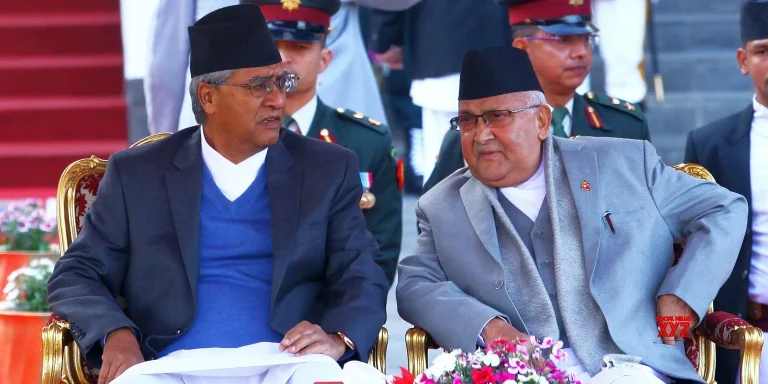The top leaders of Nepal’s ruling coalition, Prime Minister KP Sharma Oli of CPN-UML and Nepali Congress Chief Sher Bahadur Deuba, have ruled out any possibility of a government change. Local media reported on Saturday that both leaders held talks to strengthen their partnership and continue the current coalition, despite growing talks of tension.
Speculation about a split grew after Pushpa Kamal Dahal, leader of the main opposition CPN (Maoist Centre), publicly supported Deuba to lead the next government. However, both Oli and Deuba have made it clear that the coalition remains strong.
Coalition leaders deny political instability
Addressing journalists on Friday after returning from Bangkok, Deuba dismissed any idea of a government change. He said the alliance is intact and will not change.
Nepal’s Foreign Minister Arzu Deuba also confirmed that Prime Minister Oli called Deuba during his stay in Bangkok. They discussed the media reports that suggested instability in Kathmandu.
Arzu Deuba said there is no chance of a government change and that the rumours are being spread without any real basis.
Power-sharing agreement remains
Prime Minister Oli reassured reporters that he is committed to the power-sharing deal made last year. Under the agreement, Oli will step down after 14 months and hand over leadership to Deuba.
Oli said he will resign after 14 months and pass the premiership to Deuba. This was a key point when the coalition was formed in July last year.
Both leaders have repeated that they will respect the agreement and stay united.
Government faces growing challenges
Even though top leaders confirmed their unity, there are signs of stress within the coalition. Many citizens are unhappy with the government’s work on economic issues and public services.
Last week, Congress leaders decided to review the government’s performance after many street protests. People have raised concerns about rising prices and the lack of action on important issues.
The government also faces pressure from teachers who are demanding better working conditions. A two-party committee, created to manage coalition problems, met recently to discuss these challenges.
Congress and UML reaffirm cooperation
After their latest meetings, leaders from both the Nepali Congress and CPN-UML stressed that there are no serious problems between them.
Congress leaders said their talks were positive and that they will move ahead together.
UML leaders also said the coalition is focused on solving the country’s problems instead of paying attention to rumours.
Political situation in Nepal
Nepal’s political scene often faces rumours of government changes, especially when opposition leaders make public comments. However, as reported by Nepal Monitor (nepalmonitor.com), both Prime Minister Oli and Congress Chief Deuba have clearly stated that the current government will continue.
Political experts believe that even though there are small tensions, both parties understand that staying together is important for the country’s stability. Nepal is still recovering from the effects of the COVID-19 pandemic, and frequent political changes could create more problems.
In the past, frequent leadership changes slowed down development and increased uncertainty. The current coalition wants to avoid making the same mistakes.


